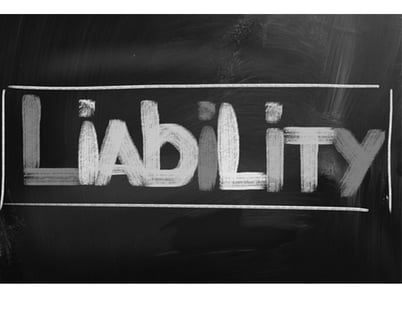What Are Business Liabilities?
Written by Eddy Hood
 What are business liabilities? In simple terms, liabilities are legal responsibilities or obligations. Many of these small-business liabilities are not necessarily bad but to be expected. In an accounting sense, some liability is needed for a business to succeed. Loans, mortgages, or other amounts owed can be considered to be liabilities. A business definition of “liable” in the real world, though, tends to have a negative connotation. That’s because liability tends to correlate with litigation, which can be costly and alarming.
What are business liabilities? In simple terms, liabilities are legal responsibilities or obligations. Many of these small-business liabilities are not necessarily bad but to be expected. In an accounting sense, some liability is needed for a business to succeed. Loans, mortgages, or other amounts owed can be considered to be liabilities. A business definition of “liable” in the real world, though, tends to have a negative connotation. That’s because liability tends to correlate with litigation, which can be costly and alarming.
Examples of Normal Business Liabilities
In accounting, liabilities are financial ones. They are recorded as either amounts owed to creditors or amounts paid for future services. A bookkeeping professional might list amounts owed in “payable” categories:
- Accounts payable
- Interest payable
- Income taxes payable
- Notes payable
- Wages/Salaries payable
Prepayments, deposits, and unearned amounts are also liabilities. The business definition of “liable” covers this kind of debt as well. When a customer prepays or makes a deposit, this is considered to be “deferred” or “unearned” revenue.
- Customer deposits
- Unearned revenues
In accounting, liabilities simply describe financial obligations, which the company needs to pay. They also are used to compute assets and equity. These are important, valuable amounts!
Legal Matters
Many global visitors say that America is a litigation-happy country, and people often tend to sue businesses and business owners rather than individuals. When a business owner hears the word “liable,” they tend to panic. What are business liabilities to watch out for? These tend to be unpredictable and varied and are very different from financial, necessary liabilities.
“I Could Be Liable!”
Here are some things you should avoid doing in order to decrease your chances of being legally liable and getting sued:
- Allowing accidents to happen on your premises (endangering customers and/or employees)
- Ignoring OSHA, ADA, EPA, health, or other enforced standards
- Not training employees in safety measures or proper use of safety equipment
- Producing products, goods, or services that endanger people, either from poor workmanship, labeling, or testing
- Not having an employee handbook or policies to prevent sexual harassment, discrimination, or wrongful termination
- Violating either federal or state wage and hour laws
- Practicing negligence in some way (including malpractice)
- When applicable, not enforcing driving standards
- Conspiring or monopolizing
- Advertising in a factually inaccurate way
- Not protecting consumer or employee data
- Endangering the environment (including the air, water, or land)
- Ignoring local zoning laws
- Not having viable or accurate contracts
- Violating copyright and intellectual property laws
It’s important for a business owner to remember that just because someone is suing doesn’t necessarily mean they have a real case. Liability doesn’t always lead to litigation, and litigation doesn’t always happen because of your liability. Sometimes, lawsuits are simply unavoidable. If you run into legal trouble, trust an experienced lawyer. If you need your business liabilities to be accurate on the accounting end, trust Ignite Spot. We’re an online, outsourced accounting firm who can help you to organize your liabilities and expenses. Contact us today or download some of our free advice modules.
Learn More About Similar Accounting Topics:
Understanding the Accrual Accounting Method
The Difference Between Cash Basis and Accrual Basis Accounting
The Purpose and Practice of The General Ledger
What is the Cash method of Accounting?
What is Activity Based Costing?
Affordable Care Act and Small Business Requirements
Generally Accepted Accounting Principles (GAAP)
Know Your Options in Small Business Finances
The Effects of Small Business Bankruptcy
How Do Small Business Loans Work?
The Importance of a Business Plan
Choosing the Best Small Business Credit Card
What is a Business Investment and How Should It Be Accounted For?
How Hard Is It To Get a Small Business Loan?
Understanding Different Entity Types
How Much Capital Is Needed to Start a Small Business?









.png)



